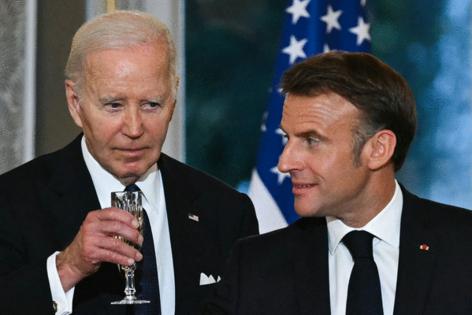Lionel Laurent: Emmanuel Macron's revolution screeches to a halt
Published in Op Eds
French President Emmanuel Macron’s snap-election gamble has backfired. First-round parliamentary votes have put archnemesis Marine Le Pen within reach of an absolute or more likely relative majority. Whatever happens next, the electorate is in a restless mood, Macron looks like a lame duck and an ungovernable France is a real risk.
Macron’s plea to reject extremes and embrace his pro-reform “revolution” proved a resounding flop. Voters turned out in droves to vote for Le Pen’s National Rally party, which came out on top with a score of about 33%, or around 12 million votes. It’s a bleak watershed moment for French politics that a party like this — which has tried to shake its history of xenophobia and antisemitism, and which as recently as 2017 advocated “Frexit” and a lifting of sanctions on Russia — did so well. Its mix of budget giveaways and anti-immigration talk make it the movement of choice everywhere, apart from Paris and other big cities.
Macronism is no longer even effective against the Left, whose various strands have become increasingly pulled toward firebrand Jean-Luc Mélenchon’s deficit-exploding ideas like retirement at 60 and his dismissal of antisemitism as “residual.” The left-wing bloc scored around 28%, not far behind Le Pen, forcing Macron to steer a new course: His entourage is now open to forming a “republican front” with left-wing candidates he once saw as toxic, going as far as to suspend his unpopular reform of unemployment insurance. Ex-President Francois Hollande, Macron’s one-time mentor who’s eyeing a return to politics, said Macron’s party (which scored around 21%) lay in “tatters.” He has a point.
With only three years to go before the end of Macron’s second term and the imminent prospect of either a hostile cohabitation with Le Pen or a chaotic minority government, it’s hard to see this as anything other than the 46-year-old’s political twilight. Perhaps some kind of centrist slab can be carved out of the left-wing bloc after the second round of voting on July 7. But it’s hard to negotiate from third place, and even harder to lead without a party. Whatever emerges from the mess will be hoping to match the Liz Truss lettuce in the UK, or the one-year limit before snap elections can be called again. Meanwhile, a far-right or left-bloc absolute majority could see French economic output flatline next year as pricey spending plans are rolled out, according to Bloomberg Economics. There is no guarantee that voters would suddenly blame Le Pen for this state of affairs or regret their choice.
How did Macron achieve something close to political bankruptcy so soon into his second term, with two-thirds of seats potentially set to go to the far right or left bloc? Gradually, then suddenly, as the joke goes. Macron’s success in driving down unemployment and drumming up foreign investment via those “Choose France” summits are to his credit; French real wages between 2019 and September 2023 also fell less than in many other countries, including the US. But Macron has proven much less able to connect with voters than Le Pen on topics like inflation and immigration. Nor has the unlocking of pandemic funds or subsidized gigafactories soothed the frustrations of rural, deindustrialized France. “Macron’s economic record is good overall,” says strategist Christopher Dembik, of Pictet Asset Management Ltd., “but he’s been unable to speak to those left behind.”
With Macron’s unpopular hike to the retirement age fresh in voters’ minds, both right and left have eagerly campaigned by rolling out unrealistic economic policy unicorns. Workers tempted by Le Pen often feel worse off than their parents or retired grandparents (who are more likely to vote Macron). There’s also Macron’s grating personal style and “Jupiterian” aspiration to rise above the fray, which have exacerbated the disconnect with voters. While not particularly rare in the Fifth Republic, even Charles de Gaulle relied on a grassroots party when it came time to govern. “Macron never built his movement into a party,” says Cambridge University political scientist Christopher Bickerton. “Over time, that isolation of power has become more pronounced.”
So while it’s still possible to limit the French far right’s gains, something seems to have snapped in the Fifth Republic. The center is weak, the left is stable and the far right is surging — having broken once-solid cordons sanitaires. At a moment when Donald Trump is knocking at the door of the White House and Germany’s own far-right Alternative for Germany (AfD) is on the rise, the West — and Europe — could do with credible leaders and bold ideas. These results suggest a French revolution may very well be on the way, but Macron won’t be the one leading it.
____
This column does not necessarily reflect the opinion of the editorial board or Bloomberg LP and its owners.
Lionel Laurent is a Bloomberg Opinion columnist writing about the future of money and the future of Europe. Previously, he was a reporter for Reuters and Forbes.
©2024 Bloomberg L.P. Visit bloomberg.com/opinion. Distributed by Tribune Content Agency, LLC.







Comments